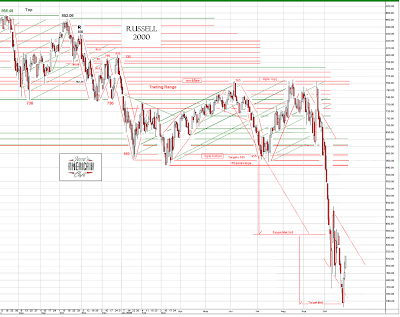"The man who is admired for the ingenuity of his larceny is almost always rediscovering some earlier form of fraud. The basic forms are all known, have all been practiced. The manners of capitalism improve. The morals may not."
John Kenneth Galbraith
There is a hypothesis that the financial sector in the US is oversized, and as such commands an excessive amount of capital allocation and overly influences GDP. We arrived at this conclusion ourselves by studying the percentage of the major stock indices represented by the financial sector, and the expansion of new financial instruments and forms of credit in the growth of asset bubbles.
There are obviously other explanations for this. One thing to bear in mind is that during the 1990's the financial sector mounted a determined, well-funded, and deliberate assault on the regulations that had been put in place in the 1930's to limit its ability to create exotic instruments and speculate in areas beyond the traditional role of commercial banking.
There is an interesting area of study by Thomas Philippon of NYU, which has been written about recently by Zubin Jelveh in Odd Numbers and is starting to receive more widespread attention.Financial Relativism: Fraud by Any Other Name 15 May 2008
The banks were central to the scheme from the inception as they spent years and many hundreds of millions of dollars to overturn Glass-Steagall to allow this coup de grâce to be delivered to all holders of US dollars.
Its interesting because it tends to support the notion that as the financial sector overcomes the regulatory restraints, it begins to expand its influence in the real economy, ultimately distorting its structure through the introduction of asset bubbles, with a resulting period of significant economic contraction. It also results in disproportionate incomes and the polarization of wealth distribution.
Why Has the U.S. Financial Sector Grown so Much? Thomas Philippon
Human Capital in the U.S. Financial Sector: 1900-2005 Philippon Reshef
"We find a very tight link between deregulation and human capital in the financial sector. Highly skilled labor left the financial industry in the wake of the depression era regulations, and started flowing back precisely when these regulations were removed."
"We find that in 1920-1940 and in 1990-2005 employees in finance are overpaid."
Thomas Philippon

The banks must be restrained from distorting the role of money and finance in the national economy to obtain and direct a disproportionate amount of wealth and power. Such unrestrained financial power is a corrosive influence that destroys the fabric of a free and democratic society by distorting the allocation of resources and corrupting the institutions of the press, of education, and of the government.
Does a weakening of banking regulation result in economic Imbalances and asset bubbles? Yes, always and everywhere.





































